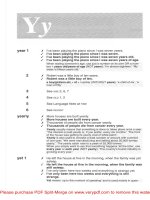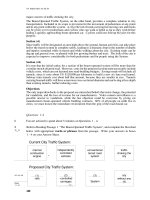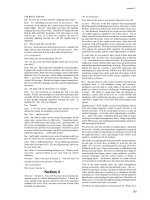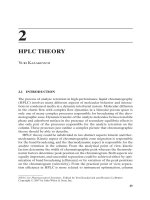Tài liệu Opportunities in technical writing careers part 2 pptx
Bạn đang xem bản rút gọn của tài liệu. Xem và tải ngay bản đầy đủ của tài liệu tại đây (105.3 KB, 10 trang )
1
The Field of
Technical Writing
Different forms of writing have been used to relay information
since ancient times. People have communicated facts, lore, data,
news, science, wisdom, and entertainment in writing using meth-
ods ranging from ancient cave drawings and hieroglyphics to the
latest bestseller, computer manual, or blog.
Writing can be broadly classified into two categories: fiction and
nonfiction. The novelists, short-story writers, poets, screenwriters,
and playwrights who produce fiction manipulate words and lan-
guage to create scenes, moods, and effects so readers can feel as
though they are unobserved, passive participants to the events
described. Nonfiction writers present facts and data in a variety of
formats, including magazine and newspaper articles, books (text-
books, biographies, how-tos, self-help, travel guides, and more),
booklets, reports, brochures, memoirs, manuals, journals, newslet-
1
Copyright © 2008 by The McGraw-Hill Companies, Inc. Click here for terms of use.
ters, advertising copy, and even the text inside the pages of the
phone book.
What Is Technical Writing?
Technical writers write, edit, and prepare publications in many
fields of technology, science, engineering, and medicine, including
articles for technical and scientific journals, both in print and
online. The publications may be technical reports, instruction man-
uals, articles, papers, proposals, brochures, and booklets and even
speeches for technical meetings and conferences.
Technical writers must remain objective and factual about the
subject matter they are dealing with. Their sole function is to write
dispassionately about facts and objects and to relate useful, relevant,
reliable information that readers can understand. The language they
use must be simple and direct and contain a minimum of non-
functional descriptive adjectives. Their verbs must be in the active
rather than the passive voice to eliminate any doubt about what the
writing means or implies.
Any writing that requires familiarity with (or willingness to learn
about) a technical field would be considered technical writing.
Writing about museum conservation is technical writing as much
as writing user manuals for a software product or a troubleshoot-
ing guide for a broken tractor. Technical writing is a useful com-
munication tool whenever information of a technical nature must
be transmitted.
Need for Technical Writers
The twentieth century saw a sharp rise in the amount of nonfic-
tion material produced, largely because of the nearly continuous
2 Opportunities in Technical Writing Careers
advances and developments in technology, which shows no signs of
slowing down. Thanks to this rapid and abundant increase, there
is a growing demand for technical writers.
In the early days of technical writing, people with scientific and
technical backgrounds were given writing assignments for which
they weren’t prepared or qualified. Not surprisingly, much of the
writing they produced was often very poorly composed, stilted, and
boring. This in no way reflects on the intelligence or education level
of the writers, but represents the difficulty of merging technical
knowledge with writing skills to produce an acceptable product. It
is not unusual for highly educated technicians to produce poor-
quality writing because their training and experience have not
focused on verbal and written skills. On the other hand, writers
with no scientific background had difficulty understanding how to
present and interpret scientific data and subject matter so that the
reader would be properly informed.
The need for technical writers arose because these situations
almost always guaranteed poor results. Managers were often less
concerned with the quality of the writing than with simply having
the work done. Sometimes the writing was so poor that readers
failed to derive any usable information from it. For example, if the
assignment was a construction manual for a process or a use man-
ual for a piece of equipment, the results could be disastrous and
detrimental to business.
Sharing Your Knowledge
Technical writers have another important function: to teach others
about their profession. One technical writing graduate who works
for the Federal Energy Regulatory Commission has led instruc-
tional seminars in technical writing for her colleagues.
The Field of Technical Writing 3
This writer has the potential to go far because she has jumped
into a new area and demonstrated her ability to explain, describe,
and illustrate. These characteristics will help her immeasurably in
preparing training programs.
Making a Name for Yourself
Will you become famous as a technical writer? It’s highly unlikely.
In fact, technical writers are often, by necessity, anonymous authors
who don’t get to see their byline attached to their work. (The excep-
tions to this rule of anonymity are people who write scientific or
technical articles for newspapers, magazines, and scholarly publi-
cations under their own names or who write popular how-to
guides.)
If you’re wondering why most technical writers don’t have a
byline, think about the last time you tried to assemble a new bar-
becue grill or program a home entertainment system. Even the most
effectively written instruction manual may leave some users frus-
trated, wishing they could lodge a complaint directly with the per-
son who wrote the instruction manual. That’s reason enough for
the writer’s anonymity!
But that aside, most employers who produce technical material
want to reach their audience with concise and easy-to-understand
language and to promote their product or train their audience in
its use. No writing stars are required or encouraged.
With that said, you can still build a name for yourself through
your list of credits. Every assignment you complete becomes
another item to add to your résumé, and in some cases you might
even be able to keep a sample of your work and create a professional
portfolio to show to new clients. Word of mouth and employer and
4 Opportunities in Technical Writing Careers
client references and recommendations also will help you to become
known in your area of specialization.
Job Titles
Although the term technical writer is the most common job title
used, there are other titles as well as ranks.
Assistant technical writer
Associate technical writer
Consulting technical writer
Copyeditor
Copywriter
Corporate technical writer
Course developer
Curriculum designer
Curriculum planner
Documentation contractor
Documentation specialist
Education specialist
Information systems writer
Instructional designer
Junior technical writer
Knowledge analyst
Lead technical writer
Senior technical writer
Software technical writer
Technical communicator
Technical editor
Technical intern
The Field of Technical Writing 5









